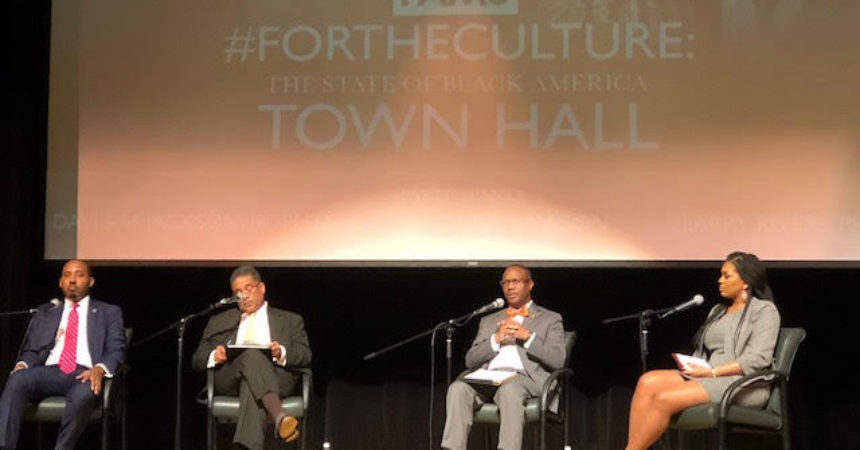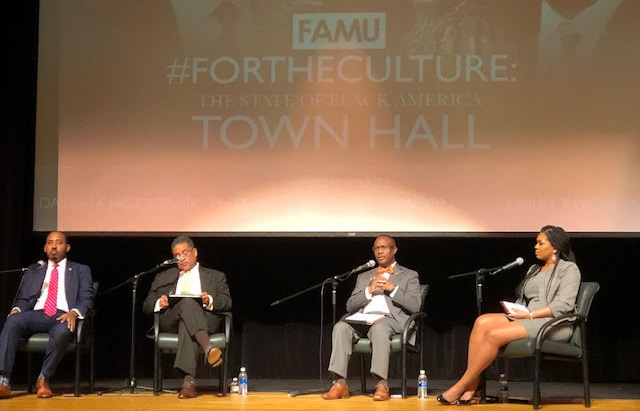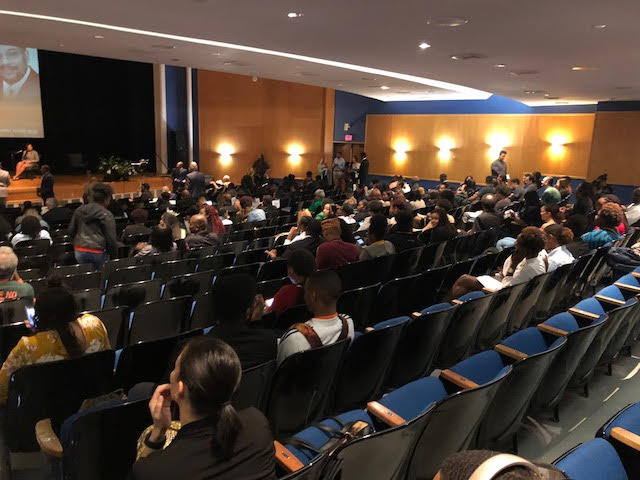
Alexander: Black politicians shouldn’t ‘sell their souls’

Left to right: Ramon Alexander, Larry Rivers, David Jackson Jr., and Alexandria Washington panelist for FAMU’s culture State of Black America Town Hall.
Photos by Kathryn Lewis
By Kathryn Lewis
Outlook Writer
More Blacks should run for an elected office and those who make it shouldn’t rise to the level that they “sell their souls,” State Representative Ramon Alexander said during a Black History month program at Lee Hall.
Alexander was one of the panelists that shared their views on the relevance of Historically Black Colleges and Universities, the lack of wealth and other disparities that Blacks experience.
The panel discussion during what organizers called #ForTheCulture Town Hall was the focal point of a recent Black History Convocation at FAMU.
Alexander, a first-term legislator, spoke candidly about special interests that tend to set politicians on the wrong path.
“You have to attempt to have a seat at the table because if you’re not at the table you’re at the median,” he said. “But unfortunately, what I see is that many of our elected officials who get a seat at the table sell their souls.
“They sell their souls to special interests. They sell their souls to big checks for private prisons. They sell their souls to those that prey on our juvenile justice system just to make money off the backs of our children.”
He encouraged his audience of mostly students to bring about change by voting.
“You don’t have to have a title or position to have influence on the outcomes of things that happen,” he said. “Just organizing. Florida A&M University has a rich history of students coming together to take on so many challenges in our , state and on a national level. We have a very active campus.”
Ironically, student activism was prominently discussed during director Stanley Nelson’s documentary “Tell Them We Are Rising: The Story of Historically Black Colleges and Universities. Preserving HBCUs also was a large part of the film, which was recently viewed at Lee Hall.
Larry Rivers, a history professor and one of the panelists during Friday’s convocation, addressed the relevance of HBCUs during the question and answer segment.
“I am really tired of defending HBCUs,” said Rivers.
The audience responded with “Amen.”
“We always ask if HBCUs are relevant,” Rivers said. “I was asked that and I turned around and asked, ‘Are historically White institutions relevant?’ My position is they are very relevant. But in order for HBCUs to remain relevant they’re going to have to continue to design innovative programs that meet the needs and concerns of the students they serve.”
The lingering question about the need for a month to recognize Black History inspired a conversation on the question. Moderator Jacquell Lawson got the discussion going, following a video clip of actor Morgan Freeman denouncing Black History Month during a 60 Minutes interview with Mike Wallace.
“I don’t want a Black History Month,” Freeman said during the interview. “Black history is American history. I’m going to stop calling you a White man and I’m going to ask you to stop calling me a Black man.”
Before it was all said and done, the audience got a short history lesson on how Black History Month came about. Panelist David Jackson Jr., explained how it evolved from Negro History Week, which started in 1926 at the urging of historian Carter G. Woodson.
“There was a National Clean Up Week, a Boy Scout Week and National Health Week, so Woodson said, ‘Why shouldn’t we have a Negro History Week?” Jackson said. “He recognized at that time African-Americans were not adequately represented in the (history) books throughout this nation.”








